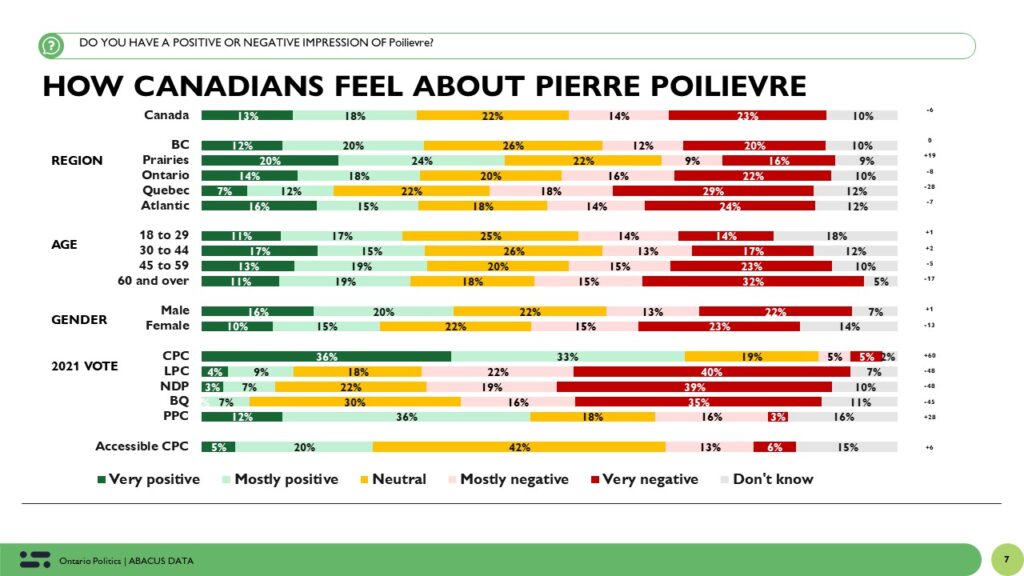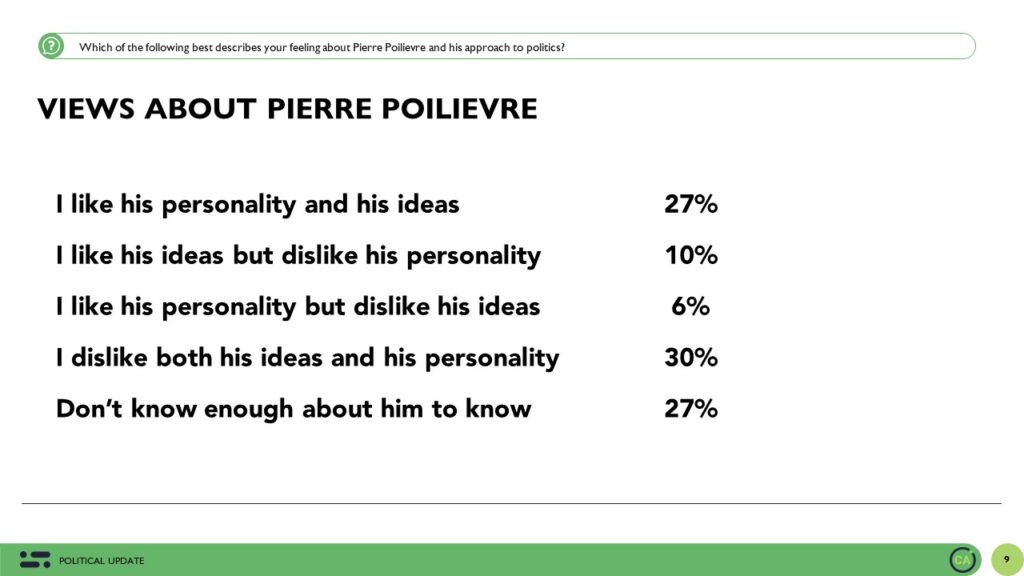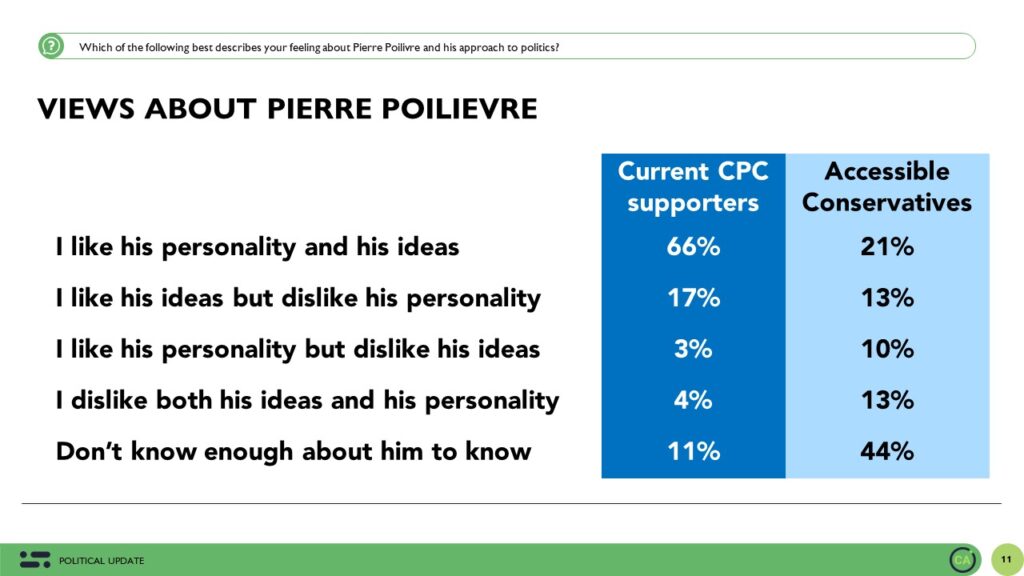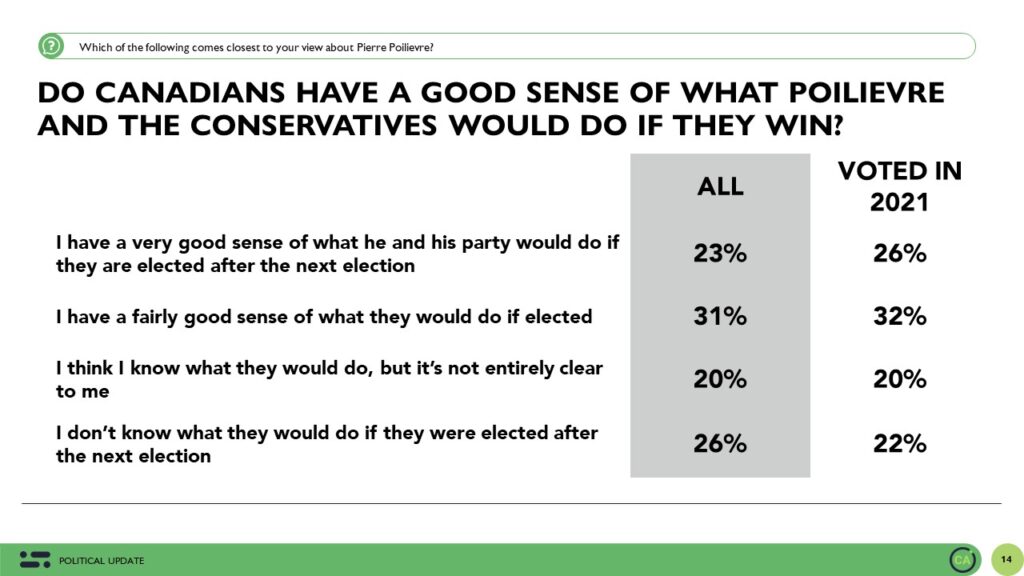What Canadians know about and think of Pierre Poilievre
August 21, 2023
With the Conservative Party launching a new ad campaign to profile its leader Pierre Poilievre and the Conservatives holding a sizeable national lead over the Liberals, the Toronto Star and its polling partner Abacus Data, launched a project to examine how Canadians would react to the campaign and their introduction to the Conservative Party leader.
On Sunday, the Toronto Star’s Stephanie Levitiz, reported on the findings of the polling we did which was meant to set and baseline for how Canadians felt about Mr. Poilievre before the Conservative campaign was launched.
The survey was conducted from July 20 to 25, 2023 and interviewed a representative sample of 2,648 adult Canadians online. The objective of the study was to develop a set of questions we would ask in July and then again later in the year to gauge how views and perceptions about Mr. Poilievre may have changed because of the campaign and other discussions about him.
Here’s what we found Canadians know and think of Pierre Poilievre as of July 25:
About half of Canadians don’t know Pierre Poilievre that well.
Having been Conservative leader for just over 300 days at the time of this survey, Poilievre is somewhat well known but about half of Canadians say they either haven’t heard of him before or if they do, they don’t know much about him.
In contrast, almost all Canadians say they know Justin Trudeau at least pretty well and 67% feel the same way about Jagmeet Singh.

Familiarity with Poilievre is higher among older Canadians, men, those in the Prairies, and among Conservative supporters. He’s less well known among those under 30 and women.

Poilievre is more well known and more polarizing than the previous two Conservative leaders 300 days into their leadership.
Overall, 31% of Canadians have a positive impression of Poilievre compared with 37% who have a negative impression for a net impression of -6. Compared with the previous two Conservative leaders at the same time in their leadership – Erin O’Toole and Andrew Scheer – Poilievre is better known and more defined. He’s also more polarizing with a larger number of people both liking him a lot and disliking him a lot (36% very positive + very negative) vs. 24% for O’Toole and 20% for Scheer.

In comparison to other party leaders, Poilievre has about the same proportion of people who have a positive view of him as Trudeau but fewer who have a negative view. His net favourable nationally is -6.

Here are Poilievre’s net favourables among some key groups:
- 2021 Conservative voters +59
- 2021 Liberal voters -49
- Men +1
- Women -13
- BC 0
- Prairies +18
- Ontario -8
- Quebec -28
- Atlantic -7
Among those open to voting Conservative but don’t currently support the party (Accessible Conservatives) Poilievre’s net favourable is +6.

What else do people feel about him?
Ideas vs. Personality: 27% of Canadians like Poilievre’s personality and his ideas, 10% like his ideas but dislike his personality while 6% like his personality but dislike his ideas. 30% dislike both while 27% don’t know enough about him to know.
Of note, 17% of current Conservative supporters say they like his ideas but dislike his personality.

When shown two descriptions that could be used to describe Poilievre, Canadians were more likely to consider him to be:
Genuine (35%) rather than phoney (28%)
Strong (39%) rather than weak (18%)
But people were more split when it came to whether he is
Extreme (33%) or moderate (28%)
Compassionate (31%) or uncaring (28%)
Vengeful (28%) or forgiving (19%)
Down to earth (31%) or elitist (26%)
These results highlight both the vulnerabilities and opportunities for Poilievre.

When we look specifically at those who feel they know him well, he is more likely to be seen as having positive charateristics but perceptions about him being extreme and vengeful highlight some potential problems for him and opportunities for his opponents to leverage.
Almost half of Canadians don’t really know what Poilievre and the Conservatives would do if they won the next election.
46% of Canadians say they either don’t know what Poilievre would do as Prime Minister if he wins the next election or they think they know but it’s not entirely clear. This is also true for those who voted in 2021 and accessible Conservative.
In many ways, Poilievre’s policy program isn’t well understood, which makes sense since he hasn’t released many details. But since about half of people don’t really know what Poilievre would do suggests there is an opportunity for him to clarify what he will do and for his opponents to set public expectations. This is further evidence why I think the Conservative lead in the horserace is more about the Liberals repelling voters than the Conservatives attracting them.

The Upshot
This is the first wave of a multiwave study exploring how Canadians react to Pierre Poilievre over the next six months. This wave was meant to set a baseline for us to compare over time.
What we know so far is that a sizeable portion of the electorate doesn’t have clear views on Poilievre or what we would do if elected after the next election. That being said, he better defined than the previous two Conservative leaders at this point in their respective leaderships.
Poilievre and Trudeau are about equal on positive impressions but Poilievre’s negatives are lower. But already 1 in 4 Canadians have a very negative view of him, suggesting he is and can become more polarizing.
His vulnerabilities are perceptions he is vengeful and extreme while his strengths are his perceived strength and how down to earth he feels to many people.
It matters less how people with strong partisan feelings react to Poilievre than how those who only partially pay attention to politics but typically vote will think. At this point, they don’t know the Conservative leader and so the race to define him – starting with the Conservative Party’s own campaign – begins.
METHODOLOGY
The survey was conducted with 2,486 Canadian adults from July 20 to 25, 2023. A random sample of panelists were invited to complete the survey from a set of partner panels based on the Lucid exchange platform. These partners are typically double opt-in survey panels, blended to manage out potential skews in the data from a single source.
The margin of error for a comparable probability-based random sample of the same size is +/- 2.0%, 19 times out of 20.
The data were weighted according to census data to ensure that the sample matched Canada’s population according to age, gender, educational attainment, and region. Totals may not add up to 100 due to rounding.
This survey was paid for by Abacus Data Inc.
Abacus Data follows the CRIC Public Opinion Research Standards and Disclosure Requirements that can be found here: https://canadianresearchinsightscouncil.ca/standards/
ABOUT ABACUS DATA
We are the only research and strategy firm that helps organizations respond to the disruptive risks and opportunities in a world where demographics and technology are changing more quickly than ever.
We are an innovative, fast-growing public opinion and marketing research consultancy. We use the latest technology, sound science, and deep experience to generate top-flight research-based advice to our clients. We offer global research capacity with a strong focus on customer service, attention to detail, and exceptional value.
We were one of the most accurate pollsters conducting research during the 2021 Canadian election following up on our outstanding record in 2019.
Contact us with any questions.
Find out more about how we can help your organization by downloading our corporate profile and service offering.



